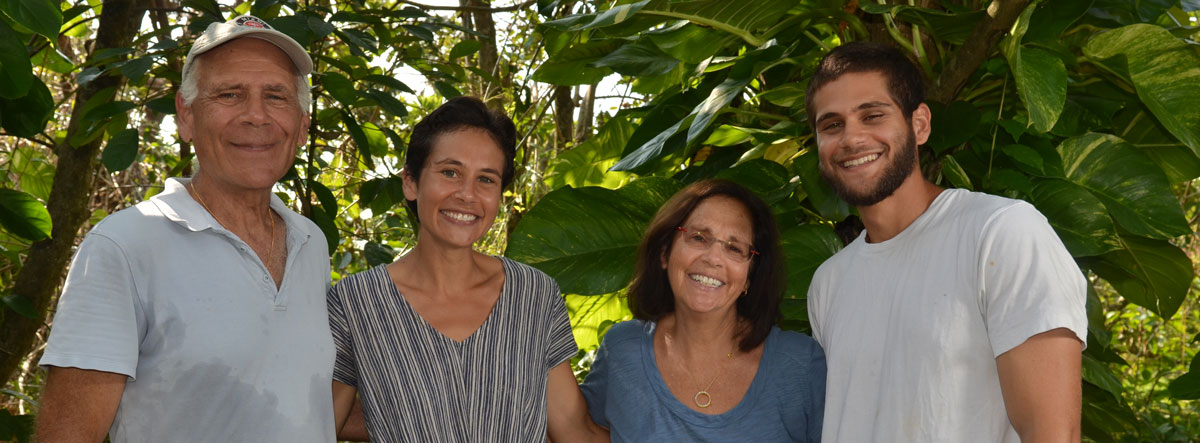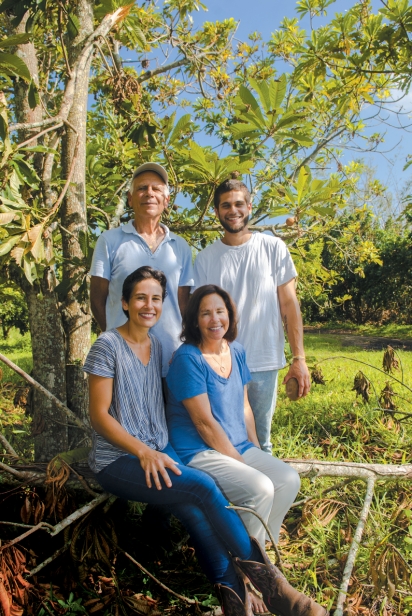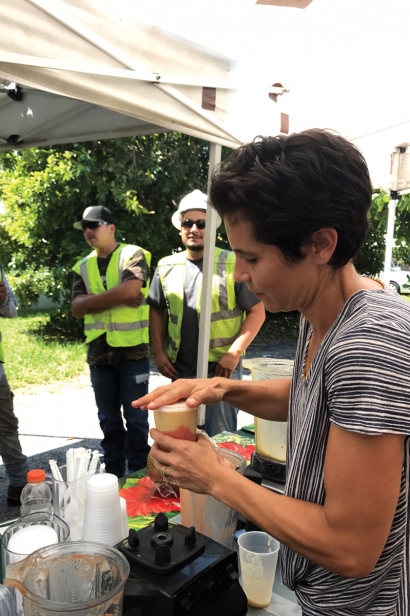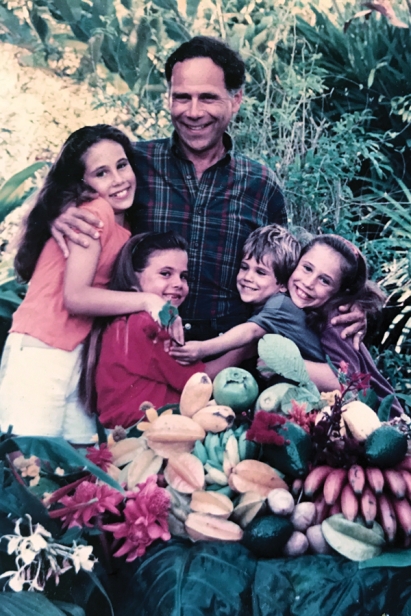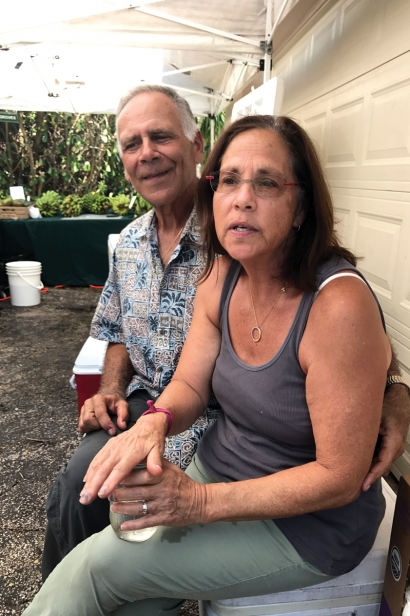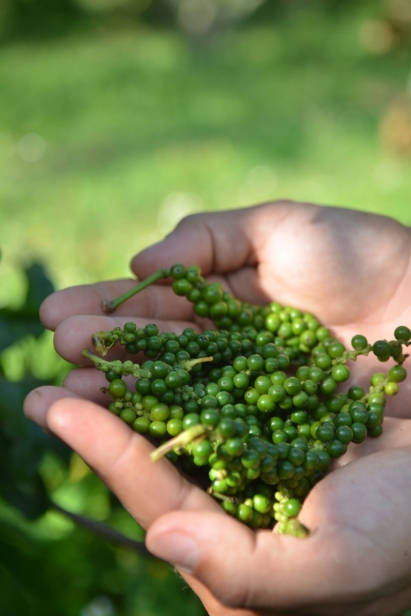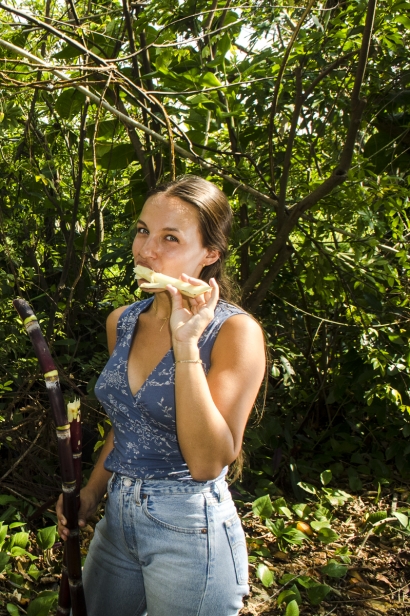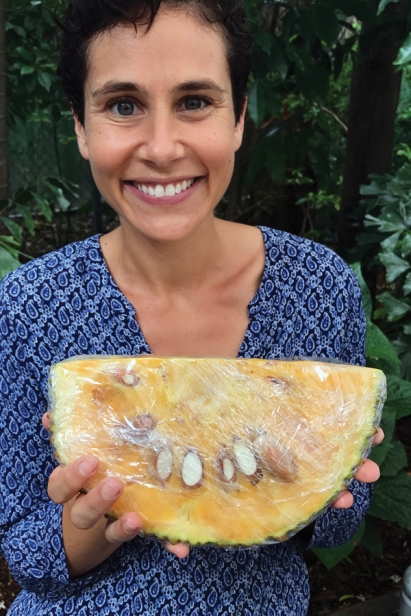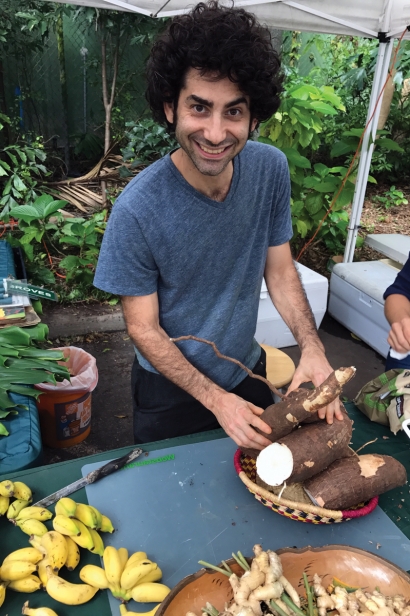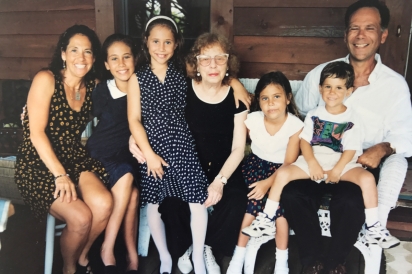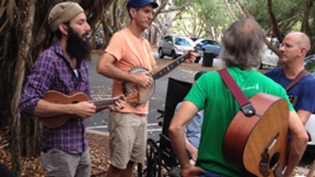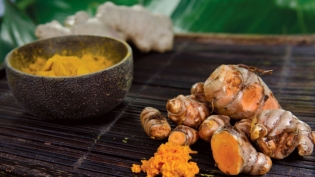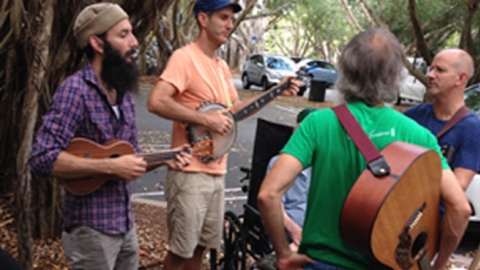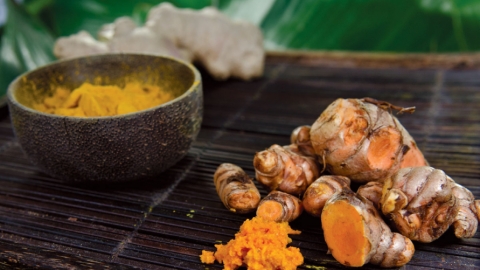The Resilient Ellenbys
Marc, Adena, Kiki and Levi Ellenby gather in front of a hurricane-damaged mamey sapote tree at their family grove. Yes, there’s a lot of work ahead, but years of experience, patience and optimism define this farming family. “See those small fruits?” says Marc. “You’re looking at next year’s mamey crop.”
It looked like a typical September day at the farmers market – Adena blending Sapodelicious (sapodilla-passionfruit-banana-mamey) smoothies and Walt packing up saffron-colored turmeric tonic, amid a tropical still life of green bananas and ripe avocados.
Except the LNB Groves tent was set up not at their usual spot at Pinecrest Gardens, but in a Palmetto Bay driveway, hidden behind mountains of branches and debris, the residential road blocked by a Louisiana crew pulling up power lines. A steady stream of customers, who had been emailed the address to this secret pop-up, figured out how to get around the detours. Seven days earlier, Hurricane Irma delivered near-hurricane-force gusts to South Florida, ripping off mamey branches, uprooting sapodilla trees, and toppling banana plants. Still, it was business as usual for the resilient Ellenbys.
Outside of the hard-hit Florida Keys, Hurricane Irma was a messy inconvenience for most urban and suburban dwellers. They faced evacuation, days without electrical power, reliable cell phone and Internet service; missed work, weekends of hauling away downed branches, cleaning out spoiled food.
But for fruit growers, the approaching storm was a big deal. Avocado and mamey growers scrambled to strip fruit from the trees and secure equipment. Had they kept up with pruning? Would tall trees survive sustained winds?
Marc: “You get hurricane-weary, hot, day after day. We have a major inconvenience. But it’s not the end of the world.”
At 67, patriarch Marc Ellenby has been through this drill before, not that it gets any easier. “We still have fuel, running water, irrigation.” But the damage to his trees and fruit? 100% of carambola fruit lost. Same for sapodilla. Bananas and papayas toppled. “Catastrophic,” he says blithely.
Marc was not always a farmer. He met his wife, Kiki, when they were in their early 20s in Chicago, followed her to Colorado, then moved to Indiana, where they taught transcendental meditation. Her mother, Lois, wanted a vegetable garden, so they made a garden. “She planted the seed,” he says. Marc went back to school at Clemson, then moved to Gainesville, where he took a tropical fruit course with Carl Campbell, fruit expert Richard Campbell’s father. In the summer of 1978, Marc and Kiki moved to South Florida and immersed themselves in the world of tropical fruits. They visited the Campbells. “Becky [Richard’s mother] would make key lime pies with Persian limes and key limes and ask if we could taste the difference,” he says. (He couldn’t).
The Ellenbys started their home fruit grove in 1980, starting with annonas – sugar apples and atemoyas, then adding multiethnic trees – tropical fruits that appeal to different cultures. One of those was sapodilla – chikoo in India; nispero in Venezuela; naseberry in Jamaica; dilly in the Bahamas. They also planted lychee, longan and starfruit. At the same time, Ellenby worked for what is now Brooks Tropicals, a top grower, packer and shipper of tropical produce, and acquired more acreage. He spent $1,700 on a 1938 frame house near the Orange Bowl and moved it by truck down U.S. One to the grove in the Redland.
Longtime South Florida farmers talk about the past in terms of before and after Hurricane Andrew, notes Marc’s son Levi, who was 11 months old when the storm tore up Homestead and the Redland on Aug. 24, 1992. The farmhouse did fine, but they lost their annonas. “One good decision was planting starfruit,” says Marc. “They shed fruit and leaves during a storm, but the trees are still standing.” In 2011’s Irene, “100 percent of the young sapodillas came down,” he says. “We stood them up with rebar and whitewashed them because they get sunburned.” Katrina dumped two feet of rain on the farm. Wilma pummeled them with five hours of fierce winds. They had a 12-year grace period till Irma.
“Am I crying the blues? No!” he says. “I have ice, shelter, a healthy family,” he says. “It’s at least a year of cleanup, standing up trees, repairing irrigation, pruning properly. We’ll have a carambola crop. I’m looking at other crops – red guava, small fruits, more rhizomes, leaves and stems, roots and shoots.”
Kiki: “It’s too hot, too cold, too dry, too wet. It’s always something. You have to be flexible.”
For Kiki, always having a garden was part of raising four kids – Adena, Aliya, Jody and Levi. “They always grew up with dirt in their toes,” she says. When they were little, they would sell frozen lychee for a dollar a cup at festivals at Fruit and Spice Park. Kiki says she and Marc saw firsthand the value of growing different tropical fruits. “When we grew huge sugar apples, we learned everyone in Cuba had sugar apple. New ethnic groups would find us. The whole family would come, and everyone had a different story,” she recalls. “Old people brought their grandchildren to tell them the stories.”
Of their children, Aliya and Jody, both teachers, live out of town, while Levi and Adena work in the family business. “Levi helps with decision making on the farm,” she says. Adena and [her husband] Walt provide value-added agriculture, turning fruits into something new by making smoothies and tonics to sell at the farmers market. “Diversifying is how you’re going to work through it,” says Kiki. Decades of meditation helped, too. “We made a choice to meditate and it is the basis for our resilience.” Still, once storms pass, it’s time to reevaluate.
“We’re thinking to downsize,” she ponders. “Pick the best groves. Less could be more.”
Levi: “It takes living on the farm to know it.”
The youngest of the Ellenby siblings, Levi, 26, was born on the family farm but was still a toddler when the family moved to Palmetto Bay. He worked on the farm while in high school, picking lychee and longan with the crews, fixing sprinklers and pruning trees. He studied horticulture at Clemson, took environmental classes at FIU and Jonathan Crane’s class at TREC (Tropical Research and Education), where he learned about pruning, preparation for storms, and hands-on growing. Levi and his longtime girlfriend, Sara Diaz, worked the Monday night farmers market at the Arsht Center in downtown Miami, serving up guacamole and sampling jackfruit from their booth near busy Biscayne Boulevard, where motorists would stop traffic to stare in amazement at the giant fruits. Levi and Sara now live on the organic family farm, where – for right now, at least – his attention is focused on the tasks at hand: months of cleanup post-Irma, reassessing crops, working with their crew of six, helping his father with his worm composting project.
“It’s really about adapting. We know turmeric is a great organic crop and it’s hurricane resistant. Sweet potatoes, sugarcane, smaller trees that are lower to the ground are less vulnerable. We want to grow plants where everything has a purpose,” he says, pointing to pepper vines on sapodilla trunks and sorrel planted in between young carambola trees. “Right now, I see the farm as one extensive project.”
Adena: “What we have is so special, it’s natural for me to want to share it.”
She is the relentlessly sunny goodwill ambassador for jackfruit, the massive Asian tree-borne fruit that can reach as much as 80 pounds. Week after week, Adena chops and cleans the latex-sticky fruits to expose the edible bulbs, which taste like banana, pineapple, perhaps mango, with notes of Juicy Fruit gum. After trying jackfruit in smoothies and as cleaned fruits for the past few years at the LNB Groves stand at the Pinecrest Farmers Market, some customers now buy hunks of fruit to clean themselves. “This summer was the first season I could sell it by the chunk, not fully cleaned. It took that long for people to learn to like it enough to get sticky from latex.”
Her success didn’t happen overnight. Adena, who studied culinary nutrition at Johnson and Wales and worked as a chef, started sharing her love of tropical fruits by making them into approachable products: black sapote brownies, guacamole, smoothies, sold at a single booth at the market. “It was a bake sale,” says her husband, Walt. They learned to simplify their menu and do seasonal smoothies – “Jackson,” made from jackfruit, passionfruit and banana; “Sapodelicious” and “Tropikale,” a green blend of kale, ginger, passionfruit, sapodilla and banana. Turmeric tonic uses fresh turmeric, black pepper and honey or stevia, sold in insulated bags and popular with bodybuilders and elite athlete trainers.
LNB Groves lost fresh fruit in the storm, but it won’t affect the next season for smoothies. Their tropical fruits are frozen at peak ripeness, and Adena says her father had a diesel generator from Andrew that allowed eight chest freezers of jackfruit, mamey, bananas and other fruits to stay frozen.
Walt: “You’ve never met a more generous family.”
A jewelry designer, Walt Adler Chefitz is quick to say he is a “farmhand who married into the family.” Before he and Adena married, they knew each other’s family for years. “I’ve learned generosity and kindness,” he says. A fixture at the smoothie stand, Walt brings tech knowledge and strategic planning ideas to the family business. In the aftermath of the hurricane, Walt wonders if plans for a warehouse and processing facility will go on the back burner while the fruit trees recover. “We may not expand this year,” he says.
Walt sees a powerful connection between the family groves and the community because of Kiki’s late mother, Lois Weisberg, who died in January 2016 at the age of 90 – and not just because she’s the one who wanted that vegetable garden. Longtime market visitors might have seen Lois helping at the farmstand in her final years unaware of her many accomplishments. The former cultural affairs commissioner of Chicago, she was featured in Malcolm Gladwell’s “Six Degrees of Lois Weisberg” in The New Yorker and his bestseller, The Tipping Point.
“Lois was one of the unique people who connects other people,” says Walt. “She always said to introduce customers to each other.” As a result, LNB Groves creates a weekly newsletter that profiles their customers instead of promoting their products. “Our customers are musicians, doctors, politicians,” he says. “The newsletter lets them talk about each other.”
So when Hurricane Irma hit and the following week’s market was called off, he knew they could successfully host this backyard market for their regular customers – “85 families RSVPed,” says Walt. Despite the heat and debris, people showed up for smoothies and tonics, to share stories with the Ellenby family and to visit with each other – all connected by fruit, family and the powerful, unseen force of community. Lois had planted some good seed.
LNB Groves
Find them every Sunday at the Pinecrest Gardens farmers market. Sign up for their newsletter here or at the market.


